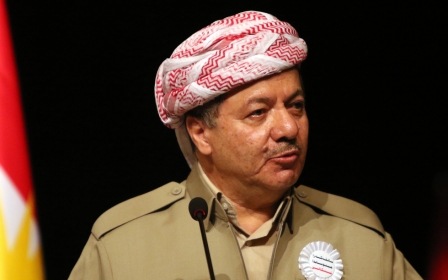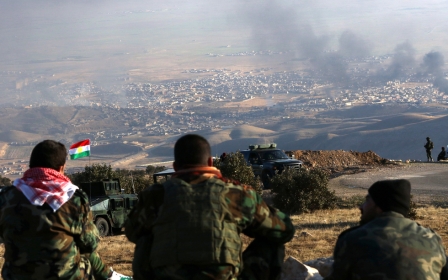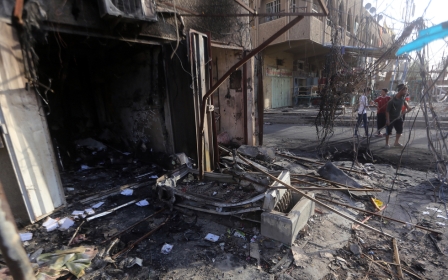Iraqi Shia fighters hope for the coming of Putin

Karbala, IRAQ - Nadim Kadhum has two wishes as he lies in the Imam Hussein hospital in Karbala, shot in the pelvic bone by an Islamic State sniper early last week near Baiji. One is to make a full and rapid recovery. The other is for Russia to strike targets in Iraq, just as it has been doing in Syria.
“If Russia can help, it would be a big support for us,” he told the Middle East Eye.
Standing beside the bed of his 28-year-old brother stood Salim, 21, also a soldier, who echoed his view. The Americans were not doing enough to help Iraqi forces in the fight against IS and in several cases they were hitting the wrong people. The Russians would be preferable.
Salim cited his experience in January near Ramadi, in the Sunni-dominated province of Anbar. "We were with an Iraqi army unit of about 150 men with six armoured personnel carriers," he said.
"We were ordered to stop because IS were in front of us. We contacted the [US-led] coalition and pinpointed the IS men's location, about 200m northeast of us. But the US hit our unit and 36 men were killed by their air strike."
Salim believes the strike was deliberate: "The US military is very advanced and can hit anywhere in the world. Why did they hit us?" he asked.
Whether or not his analysis is correct, it reflects a deep suspicion of the US role in Iraq that pervades almost every conversation in this largely Shia city. By contrast, Russia's intervention in Syria is seen as unambiguous.
"The Russians are more serious in the fight against terrorism because their aim is to defeat it," said Hussein Obeid Musa, 52, from his bed in a neighbouring ward in the hospital. He had survived unscathed for 30 years in the Iraqi army until an IS mortar bomb landed close to him on the outskirts of the IS-held city of Ramadi on 3 November. The lower half of his left leg had to be amputated.
In his view US policy in Iraq was governed by the fact that Saudi Arabia was a leading sponsor of IS while also being a close ally of the Americans.
"Saudi Arabia is in the driving seat. It runs everything. It’s with the US, and that holds the Americans back," he said.
Russia’s Syrian intervention is so popular that stories have spread on social media that Vladimir Putin, Russia’s president, is of Arab descent. His real name is said to be Abdul Amir Abulteen. Arabic uses “b” instead of “p” and the last word is a pun on Putin. It means, literally, "father of figs," or someone who owns a large quantity of them - a fig farmer.
Doctored images of Putin wearing the headscarf of a tribal sheikh have also been circulated.
Senior figures in Karbala also see benefits from Russia’s decision to enter the air war in Syria. Discounting Western governments’ claims that the Russians are mainly hitting moderate forces rather than IS, they say that all the Syrian government’s armed opponents are extremists.
The Russian intervention in Syria had prompted the US to operate better in Iraq, according to Taiseer Alasady, the editor of a local news agency in Karbala.
“Iraqis are not interested in a conflict or competition between America and Russia. We want peace," he said. "But US air strikes here are having more impact since Russia started its air strikes in Syria. They were not serious before. The Americans were just defending their own interests."
He drew a contrast between the way the US reacted last year when IS moved towards Erbil, the capital of the Kurdish region of Iraq, and when IS moved towards Baghdad this spring. “The Americans confronted IS in Kurdistan, but when IS came within range of Taji [a dozen miles north of Baghdad] they did nothing,” he said.
Qassem Musleh ended his term last week as commander of the Ali al-Akbar brigade, one of three largely Shia militias, known as Popular Mobilisation Units, which are financed by southern Iraq’s two main shrines in Karbala and Najaf. He said the Russian intervention in Syria was not just a model for what could happen if they also intervened in Iraq.
"It has had a direct effect on our war in Iraq by cutting the connections and decreasing the number of IS terrorists flowing here from Syria," he told MEE.
He said that mistrust of the US among Iraq’s majority Shia population went back to their experience in 1991 when the US failed to back Shia civilians who rose up against Saddam Hussein. His troops even used artillery against the shrines where hundreds had taken refuge.
Musleh spent three years in prison afterwards as an alleged ringleader of the uprising. “This is where Iraqi people lost their trust in the United States. That’s why Iraqis didn’t support the US in 2003,” he said.
The other foreign country, already involved in Iraq, is Iran. An unknown number of Iranian advisers, mainly from Iran’s Revolutionary Guard Corps, are engaged in the war against IS.
Opinions among wounded men and their relatives in the hospital on whether Iran’s role should expand were mixed. Some soldiers interviewed by MEE wanted Iranian troops to join the war, others were against it. But all hoped that Russian air power would come into play.
Much of that mistrust is felt by the current Shia-led Iraqi government. Although it called for US help and weapons supplies when IS launched its attacks last year, and accepts the presence of 3,500 US advisers, it has also started to work with the Russian military.
When Putin started building a Russian air base near Latakia in Syria this summer, the Iraqi government resisted a US request to deny Russian military transport aircraft the use of Iraqi airspace.
In September, Iraq and Russia, along with Syria and Iran, signed an intelligence and security co-operation agreement.
After meeting Putin at the UN General Assembly in New York, Iraqi Prime Minister Haider al-Abadi even said he would welcome a Russian offer for strikes in his country.
Marine General Joseph Dunford, the chairman of the US Joint Chiefs of Staff, flew to Baghdad to warn Abadi he had to choose between the US and Russia.
The Iraqi prime minister backed down. Had he stood firm, the wounded men in the military wing of the Imam Hussein hospital would have been the first to applaud.
New MEE newsletter: Jerusalem Dispatch
Sign up to get the latest insights and analysis on Israel-Palestine, alongside Turkey Unpacked and other MEE newsletters
Middle East Eye delivers independent and unrivalled coverage and analysis of the Middle East, North Africa and beyond. To learn more about republishing this content and the associated fees, please fill out this form. More about MEE can be found here.






